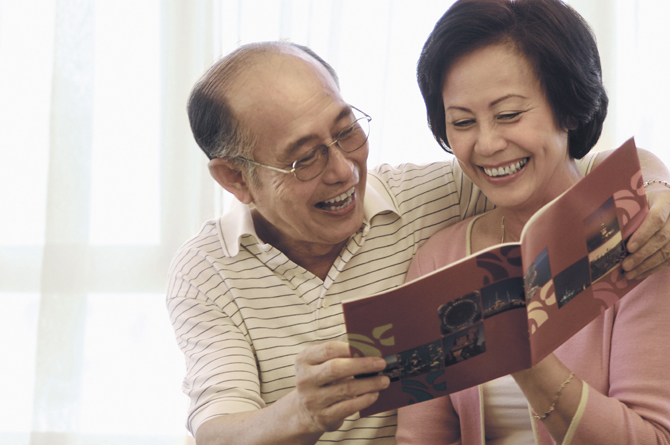
Parkinson's disease is a chronic degenerative disorder of the central nervous system commonly found in senior citizens aged 60 or over, although onset of the disease can be as early as 40 or even 20 years of age. We spoke to Winnie Chan, Chairperson of the Executive Committee of Hong Kong Parkinson's Disease Association, to learn more about the disease.
Causes and Symptoms
Parkinson's disease is a chronic progressive neurological disorder resulting from the degeneration in the part of the brain called 'substantia nigra', which leads to the insufficient production of dopamine – a chemical responsible for the transmission of neural signals in the brain – and the insufficient release of which can directly affect muscular movement, and therefore drastically inhibit the patient's mobility. "There are currently 16,000 Parkinson's disease patients in Hong Kong, most of whom are senior citizens while 20% to 30% are young people," said Chan.
While most cases of Parkinson's disease are idiopathic (causes unknown), the disease can be caused by meningitis, skull injury, brain tumour, brain calcification, carbon monoxide poisoning or other chemical poisoning. "Parkinson's disease is also called an 'invisible disability' because the medical field has yet to identify causes of and treatments for the disease," said Chan.
Symptoms of Parkinson's disease include uncontrollable tremor of the limbs, rigidity in muscle of the limbs (difficulty in stretching or bending), slow movement (such as difficulty in writing, motionless sitting or lack of facial expression), and balancing difficulty. The majority of the symptoms would appear in the upper limb on one side and then spread to the leg on the same side of the body, before spreading to the other side of the body.
Treatments and Preventions
"Preventions and treatments for Parkinson's are yet to be identified by the medical field, and patients mainly rely on medication, physiotherapy, occupational therapy, and surgery to relieve symptoms and slow down the deterioration process," said Chan.
Relying majorly on medication, patients can take regular medication to control the disease by increasing the amount of dopamine, slowing down the metabolism of dopamine in the brain, and blocking the action of acetylcholine in the brain. It is wise to seek medical help upon detection of symptoms of Parkinson's disease, and start regular medication early to prevent deterioration of the disease.
Currently available at three hospitals in Hong Kong (the Prince of Wales Hospital, Queen Mary Hospital, and Queen Elizabeth Hospital) is the Deep Brain Stimulation (DBS), a surgery treatment that implants a probe or electrode into a clearly defined brain region, connected by a coiled wire called 'the lead'. The stimulator is implanted into the chest (near the collar bones) and serves a function similar to the pacemaker. Since the stimulator in the left brain can only help the right hand and leg, and the stimulator in the right brain can only help the left hand and leg, most of the surgeries are done to both sides of the brain simultaneously. "This technology is well-recognised for its sophistication in foreign countries, and its effectiveness is supported by research, making it suitable for late-stage patients. However, the surgery is also rather expensive, meaning only a few operations are done at each of the three hospitals every year."
In addition to medication and surgery, physiotherapy, occupational therapy and speech therapy can also offer positive help to the patients: physiotherapy aims at strengthening the patient's mobility through moderate amount of exercises, while occupational therapy majorly trains the patient's self-care skill, and speech therapy, on the other hand, can help improve speaking and swallowing problems. "Patients must persist with their exercise routine, such as Taichi or walking, to promote the release of endorphins (neurotransmitters that relieves pain and generates feeling of happiness). It's important to know that the effects of medication are weakened by negative emotions, which is why patients need to relax and attain peace of mind."
Family and Community Support
Among the 1,000 members of the Hong Kong Parkinson's Disease Association, 700 are patients and the rest are their family. "Parkinson's disease affects the patient's facial expression and movements of the limbs, which can often isolate the patients from the outside world. Understanding and care from their family is therefore very important," said Chan. Thanks to the advancement of information technology, the public, increasingly learning more about the disease, is able to offer more support and understanding. "Many Parkinson's patients are now increasingly 'coming out', as early diagnosis can lead to better treatment for the disease."
The Hong Kong Parkinson's Disease Association is currently the only group for Parkinson's disease patients in Hong Kong. It organises various regular educational seminar, home visits, social gatherings and exercise classes for the patients and their families, as well as makes referrals of social counseling through the local Community Rehabilitation Network, and physiotherapy or the Chinese Tuina massage services at hospitals. Visit the association's website www.hkpda.orgfor more information.
Special Thanks:
Winnie Chan, Chairperson of the Executive Committee of Hong Kong Parkinson's Disease Association